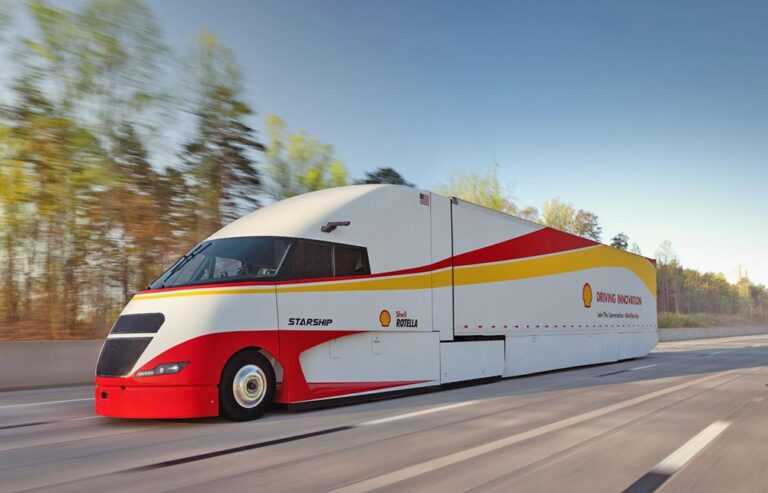HOUSTON – The Shell Starship program doesn’t aim to boldly go where no trucker has gone before, but it is designed to offer better fuel mileage across America’s interstates.
At least that’s what company officials are touting.
According to a news release, Shell says that the Starship — a sweeping, curved, aerodynamic rig fitted with side skirts that stretch from the truck’s rear wheels to the end of the trailer — exceeded its 2018 results in a second cross-country run that used energy-efficient technologies to show what could be achieved driving a Class 8 truck in real-world conditions.
The vehicle is designed to optimize performance and efficiency, company officials said.
Following the initial program in 2018, the Shell Lubricants Solutions and Shell Technology teams worked together to pair data from the first run with recent advancements in technology to develop the Shell Starship 2.0 truck.
The 2.0 truck features a new chassis and drivetrain, along with new safety and fuel-efficient upgrades while maintaining the bespoke body from the original truck.
Shell Starship 2.0 made a cross-country drive across the U.S. from San Diego to Jacksonville, following the same route as in 2018. A second, shorter 400-mile evaluation run was conducted to provide additional data about its freight ton efficiency and fuel economy benefits. Both trips were monitored and verified by the North American Council for Freight Efficiency.
For the cross-country drive, Shell Starship 2.0 achieved 254 ton-miles per gallon for freight ton efficiency – a 3.5 times improvement over the North America average freight ton efficiency.
“Freight ton efficiency is the most relevant statistic for judging the energy intensity associated with moving cargo from point A to point B since it combines the weight of cargo being moved with the amount of fuel consumed,” a news release said.
“Shell Starship 2.0 achieved an impressive 10.8 MPG on its cross-country run as compared to the 8.94 achieved by Starship 1.0 and the 6.4 MPG North American fleet average MPG. These numbers are made even more significant given Shell Starship 2.0 beat the 178 ton-miles per gallon for freight ton efficiency achieved in 2018 while carrying an 18% increase in payload, from 39,900 pounds of clean reef material in 2018 to 47,100-pounds this year.”
Jeff Priborsky, global marketing manager for the on-highway fleet sector of Shell Lubricant Solutions, said that “with increasing efforts to decarbonize road freight, we saw an opportunity to further demonstrate that the use of today’s efficient technologies can offer significant benefits to fleets.
“Understanding that not all fleets run fully loaded from coast-to-coast we felt it was important to conduct a variety of tests to provide additional data that can show how trucking efficiencies work in different conditions, in order to provide tangible benefits to the freight transport industry.”
The 400-mile short haul evaluation was completed in North Carolina with a cargo weight of 17.5 tons which was chosen to reflect more typical payload, commonly used by many fleets. The average fuel economy obtained was 12.0 mpg and the freight ton efficiency value was 210 ton-miles per U.S. gallon.
While both values are direct consequences of the reduction in cargo mass, these are significant numbers when compared to the U.S. average of 6.4 mpg and 72 ton-miles per gallon. The fuel mileage is almost double the U.S. average and the ton-miles is more than triple.
“The efficiency testing with different payloads and miles driven demonstrate that efficient technologies have significant benefits for long-haul and shorter regional-haul applications,” said Robert Mainwaring, Technology Manager for Innovation, Shell Lubricants. “Fleets and owner-operators can evaluate which technologies are most beneficial for them and pursue them today to find significant fuel savings and carbon emissions reductions.”
The Trucker News Staff produces engaging content for not only TheTrucker.com, but also The Trucker Newspaper, which has been serving the trucking industry for more than 30 years. With a focus on drivers, the Trucker News Staff aims to provide relevant, objective content pertaining to the trucking segment of the transportation industry. The Trucker News Staff is based in Little Rock, Arkansas.














